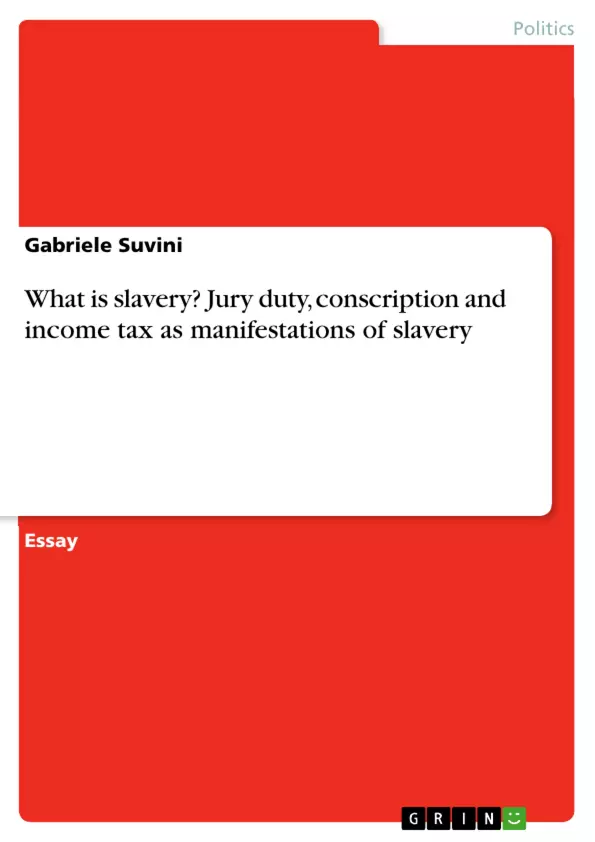What is slavery? Is jury duty? Is conscription? Is income tax? This essay seeks to examine whether three apparently diverse phenomena – jury duty, conscription and income tax – can be regarded as manifestations of slavery. The views of prominent philosophers – Hobbes, Kant and Nozick – are examined on the implicit question of coercion and whether they deem coercion to be a form of slavery.
The conclusion is reached that the non-consensual and forced nature of the three State duties in question, where no better options other than compliance are achievable, make them forms of coercive subjugation. The view is taken that this bondage impinges upon freedom and is intrinsically wrong. It raises prima facie ethical and mental health issues, and threatens autonomy and our rightful state of Nozickian ‘self-ownership’.
Inhaltsverzeichnis (Table of Contents)
- What is Slavery?
- Jury Duty
- Conscription
- Income Tax
Zielsetzung und Themenschwerpunkte (Objectives and Key Themes)
This essay explores the controversial claim that jury duty, conscription, and income tax are all forms of slavery. The author argues that each of these practices shares defining features with slavery, such as being non-consensual, forced under the threat of violence, and offering no better alternative. The essay examines the views of prominent philosophers – Hobbes, Kant, and Nozick – on coercion and its relationship to slavery.
- The definition and characteristics of slavery
- Coercion as a defining element of slavery
- Philosophical perspectives on coercion
- The ethical and mental health implications of involuntary servitude
- The concept of self-ownership and its limitations
Zusammenfassung der Kapitel (Chapter Summaries)
- What is Slavery?: This section establishes the defining features of slavery as non-consensual work forced under the threat of violence, with no better alternative. It introduces the essay's core argument that jury duty, conscription, and income tax share these characteristics.
- Jury Duty: This chapter examines the compulsory nature of jury service in the UK, highlighting its non-consensual and coercive aspects. It delves into the legal implications of non-compliance and the potential powerlessness experienced by individuals summoned for jury duty.
- Conscription: This section explores the practice of compulsory military service in various countries, demonstrating its non-consensual and forced nature. It highlights the mental health implications of conscription and the "no better option" scenario faced by individuals in countries like Brazil and Syria.
- Income Tax: This chapter analyzes the relationship between income tax and slavery, drawing upon Robert Nozick's libertarian philosophy of self-ownership. It argues that income tax amounts to a form of forced labor, violating the concept of self-ownership.
Schlüsselwörter (Keywords)
The essay focuses on the concept of slavery, exploring its defining characteristics and its potential application to various societal practices. Key themes include coercion, non-consensual labor, self-ownership, philosophical perspectives on coercion, and the ethical and mental health implications of involuntary servitude. The work examines the views of prominent philosophers like Hobbes, Kant, and Nozick, and draws upon relevant concepts like the social contract and the libertarian view of the state.
Frequently Asked Questions
Can income tax be considered a form of slavery?
Drawing on Robert Nozick's philosophy, the essay argues that income tax amounts to forced labor and violates the principle of "self-ownership."
Is jury duty a manifestation of coercive subjugation?
The essay views jury duty as a non-consensual state duty forced under threat of legal action, which impinges upon individual freedom and autonomy.
What is the libertarian view on conscription?
Conscription is seen as involuntary servitude that threatens mental health and autonomy, offering no better option than compliance under threat of violence.
What defines "slavery" in this philosophical context?
Slavery is defined as non-consensual work forced under the threat of violence, where the individual has no achievable better alternative.
Which philosophers are discussed regarding coercion?
The essay examines the views of Thomas Hobbes, Immanuel Kant, and Robert Nozick on the nature of coercion and state power.
- Arbeit zitieren
- Gabriele Suvini (Autor:in), 2022, What is slavery? Jury duty, conscription and income tax as manifestations of slavery, München, GRIN Verlag, https://www.grin.com/document/1316054



